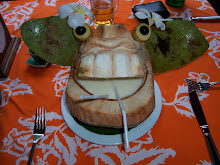But not as happy as I would be if I beat 3:30 and so a goal was set.
I was on track of about a 3:33 in 2007 until I cramped so violently at the 38km mark that my first thought was I had torn my hamstring from the bone. It was a battle to finish that one in 3:42, but at least it was still a personal best.
There was quite a break before I ran my one in 2010, I was coming back from a bad planter fascia tear which had seen me gain a heap of weight. Overweight and underdone I battled through for a 3:47 which was OK all things considered, but Toadie from Neighbours did beat me (not my PB though).
Then there was 2012. I had spent the 2011/12 summer training and racing in a few triathlons. My training regime had reached as much as 8 sessions a week with lots of short distance speed work in it. I was running 5kms at close to 4 min/km pace and feeling pretty good about it.
Once the triathlon season wound up, I kept the speed work in, cut a couple of sessions and started focusing on my diet. Weight came down to about 88-90kgs (from a peak in 2010 of about 114kgs) and I started building my long run. The running continued to a peak of about 70kms a week (~32km long run) with 3 weights sessions per week. While I had a calf strain followed by severe calf tightening, I didn't suffer any of the sickness that kept me out of the 2011 marathon.
The 2012 Melbourne Marathon was held last Sunday and it went well for me. I stuck with the 3:30 pacer Ruth until about the 38km mark, then took off by myself to finish in 3:25.
Mission accomplished.
Ever so slight negative split and the best I have ever felt in a marathon (disclaimer: the last 3-4kms still hurt A LOT).
I now have nothing left to prove to myself and never HAVE to run another one of these things. That doesn't mean I won't chose to run another, but I don't HAVE to.
BEAT THAT TOADIE!
Things I have learnt about running marathons
- If you did all the things that people say give you a 5% or 10% benefit you would be at 300%. Focus on doing the training, sleeping 2 nights before and knowing your pace.
- Knowing your pace is really, really hard. Expect to get it wrong on your first marathon. The pace guides on the net are OK, so do a half marathon a couple of months before your full to get a feel for your pace. To put it into perspective, I passed over 300 people in the last 12kms.
- Carbo loading can mean just eat normally but ensuring there are carbs in your meals. It doesn't have to mean cram in the pasta and feel bloated.
- It is important to drink during your run, especially the sports drinks to avoid leg cramps (warning: too much will give you gut cramps if you are not used to them). But it is equally important not to drink too much, if you feel bloated you are drinking too much.
- Have fun, make a point of feeding off other's energy. It helps pass the time if nothing else. High fiving kids as you run is a bit of fun.
- It's going to hurt, but be mentally prepared for when it REALLY hurts. You can use a mantra, emergency jelly beans or anything else that works.
- Train. There is no substitute for training. If you combine great training with hitting the right pace you will minimise the pain on the day.
